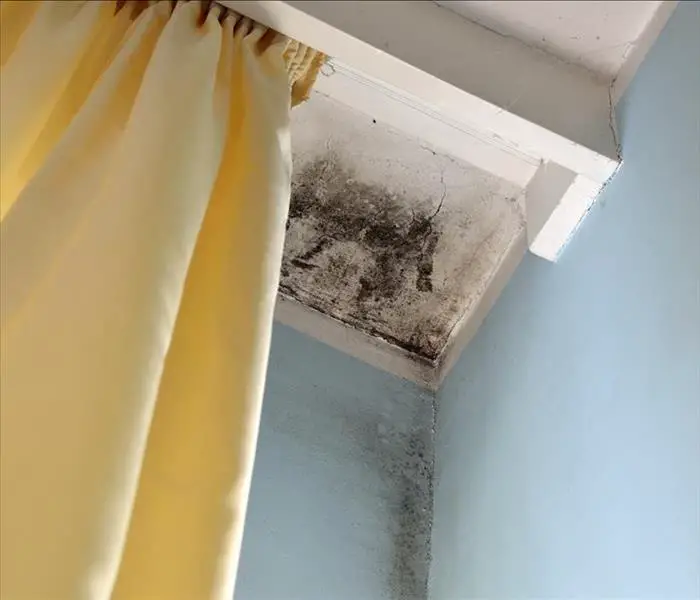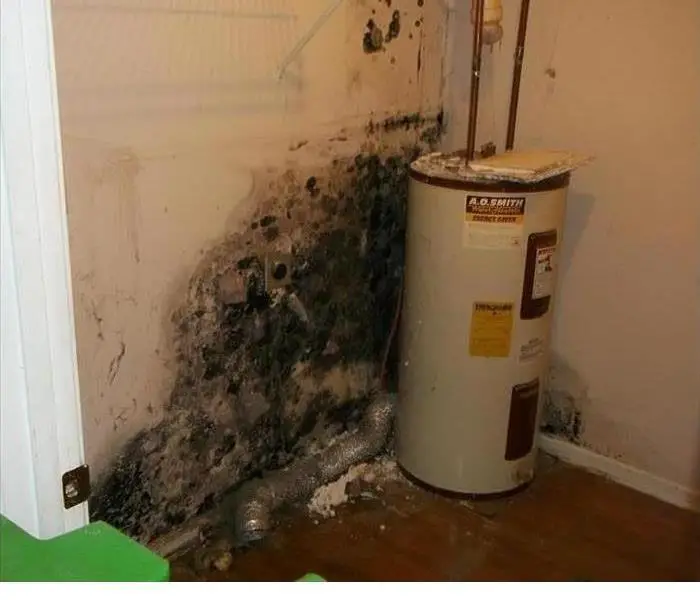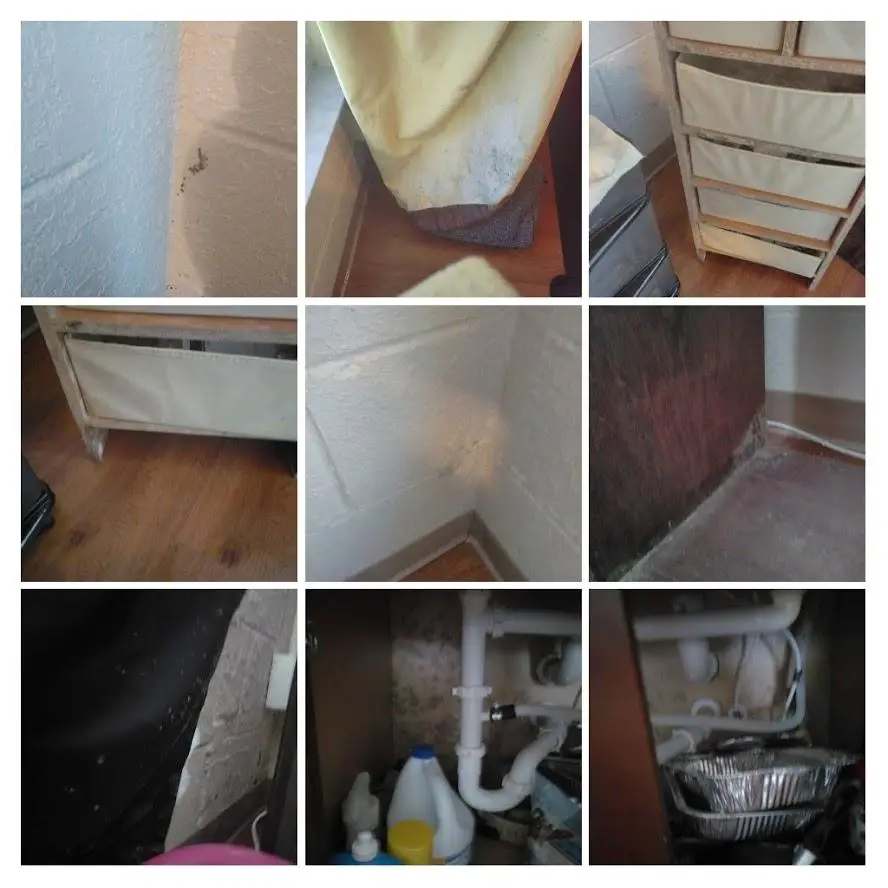Things That Can Be Mistaken For Mold
Moss, algae, and lichen can grow on the siding, roof, or patio of your home and can often be mistaken for mold. They tend to grow in naturally humid climates. You might see moss growing on apartments in Seattle, WA, but it would be pretty unusual to see it on apartments in Phoenix, AZ.
These plants tend to be harmless, but they can be signs of a moisture problem that can lead to indoor mold or damage the home. They can also mean other, larger issues with the home.
Dark stains, pollen, and even dust buildup can also be mistaken for mold damage.
When in doubt, document the problem and tell your property manager or landlord, just in case.
What You Can Do If You’re A Tenant In Texas
Tenants might feel like there is nothing they can do if they look up one day and see their ceiling spotted with a constellation of black dots.
Some landlords are very helpful, but others are notoriously slow to deal with tenant complaints. Many are even out-of-state investors who only collect rent checks and rely on property managers to deal with apartment issues.
When this is the case, sometimes tenants have to take matters into their own hands. Texas courts have recognized two self-help strategies for tenants after a mold outbreak on a rental property:
See the Texas Tenants’ Rights Handbook for more information on both strategies.
How To Test For Mold In An Apartment
While the presence of mold spores should prompt you to contact mold remediation professionals, there are some things you can do on your own to test whether or not you have a mold problem in your apartment. If your test reveals signs of mold damage in your apartment as a result of a moisture problem, dont wait to call in the professionals to test for mold.
Also Check: How Do I Know If It’s Black Mold
Mold In Your Apartment Problems Solutions And Prevention
If you suspect you have mold in your apartment, you may worry that your home sweet home has become a hazard to your health. What can you do, and whose responsibility is it to solve the problem?
Mold that concentrates on surfaces indoors can cause health problems, especially if you have a sensitivity like allergies or asthma. That’s why it’s smart to be alert for signs of mold, address mold problems quickly if you find them and take steps to prevent mold growth in the first place.
Liability For Toxic Mold In Texas

If you have health problems caused by mold on a Texas property you are leasing, you may be able to file a personal injury lawsuit against the landlord or property manager.
It is their responsibility to keep the property in habitable shape and to protect the tenants physical health and safety, as noted before, in Texas. As such, any problems associated with the building would be their problem to handle.
Also, if you just purchased a new home in Texas and toxic mold becomes obvious, the previous owner could be held liable for losses. If the previous owners knew about the mold problem, they were legally obligated to disclose this information to potential buyers.
Just like they were obligated to tell you about a leaky roof, they had to tell you about the black mold if they knew about it.
To prevent and get rid of mold:
- Keep your house clean and dry.
- Fix water problems such as roof leaks, wet basements, and leaking pipes or faucets.
- Make sure your home is well ventilated and always use ventilation fans in bathrooms and kitchens.
- If possible, keep humidity in your house below 50% by using an air conditioner or dehumidifier.
- Avoid using carpeting in areas of the home that may become wet, such as kitchens, bathrooms and basements.
- Dry floor mats regularly.
To find mold that might be growing in your home:
To control moisture problems and mold:
Read Also: How To Stop Mold On Walls
Found Mold In Your Apartment Heres What To Do
Mold is something you definitely dont want. Heres what to do if you spot it in your living space.
Get our 43-Page Guide to Real Estate Investing Today!
Real estate has long been the go-to investment for those looking to build long-term wealth for generations. Let us help you navigate this asset class by signing up for our comprehensive real estate investing guide.
When you live in an apartment, there are certain challenges you might encounter. Noisy neighbors, for example, can make home life unpleasant, while a broken elevator can make the act of accessing your living space an exercise in breathlessness and sweat. But if theres one problem you really dont want to grapple with in your apartment, its mold growth. Here, well talk about what a mold problem looks like and explain what steps to take if mold shows up in your unit.
Recommended Reading: What To Do If You Find Mold In Your Bathroom
Identify And Prevent Mold Growth Problems In Your Apartment
Understanding how and why mold can grow in your apartment, as well as knowing how to identify a potential problem is critical to avoiding the negative health effects of mold exposure.
If you do suspect a problem, contact your landlord as soon as possible and inform them of your concerns. The earlier you identify a mold infestation, the easier it will likely be to deal with. And if your landlord refuses to take action, consider contacting your municipal health department, property standards office, and legal action to get a fast resolution.
Ferro Canada is a leading environmental services company specializing in mold testing and removal. If you have mold growing in your commercial or residential building, contact our C.R.A.S.H Team and speak to an expert today.
You May Like: How To Kill Black Mold On Carpet
Mold And The Landlord’s Duty To Maintain Habitable Premises
Even if your state or city doesn’t have specific mold laws, your landlord could still be liable for a mold problem in your rental, as a result of landlords’ responsibility to provide safe and livable housing. Depending on the situation, state law might give you options such as rent withholding if your landlord fails to fix a serious mold problem, or you might be able to file a lawsuit for mold-related health problems.
Can Mold Spread From One Apartment To Another
Unlike houses, apartments are not usually self-contained living environments. Apartments exist as interconnected units with common ventilation and plumbing systems.
As a result, if one apartment has a mold and mildew problem, it can easily spread to other apartments through the air in HVAC systems.
This means that even if you remove mold from your apartment, it could still come back if other apartments in the building remain contaminated. In addition, its very difficult to find the source of the contamination especially if you dont have the help of a professional mold inspector.
Did you know?
Only 8% of living rooms we have tested didnt have presence of mold?! Find out more exciting mold stats and facts inside our mold statistics page.
Also Check: Can Black Mold Cause Irregular Heartbeat
How Can I Tell If My Apartment Has Mold
Ask yourself these three questions to determine if mold may be a concern in your home:
What do I see?
Mold appears visibly as black, gray, brown, and/or green spotting. It will likely show up around water leaks, such as around windows, under sinks, near the washing machine, or on the walls or ceiling.
What do I smell?
A musty smell is often the first sign of mold. You may only smell it when you enter your home, since youll become accustomed to the scent as you spend more time inside.
How do I feel?
Even if you dont see or smell mold in your apartment, health challenges can be a good reason to test. Mold can cause asthma and other respiratory issues, headaches, skin rashes, and irritated eyes.
How To Prevent Mold
Whether you just got rid of the mold or you dont ever want to see it in your house you need to know the mold prevention rules. To prevent mold from appearing in your house:
Small investments in prevention can go long waysand keep a lot of cash in your pocket!
Read Also: What Can Black Mold Do
What Can You Do
To prevent and get rid of mold:
- Keep your house clean and dry.
- Fix water problems such as roof leaks, wet basements, and leaking pipes or faucets.
- Make sure your home is well ventilated and always use ventilation fans in bathrooms and kitchens.
- If possible, keep humidity in your house below 50% by using an air conditioner or dehumidifier.
- Avoid using carpeting in areas of the home that may become wet, such as kitchens, bathrooms and basements.
- Dry floor mats regularly.
To find mold that might be growing in your home:
- Search for moisture in areas that have a damp or moldy smell, especially in basements, kitchens and bathrooms.
- Look for water stains or colored, fuzzy growth on and around ceilings, walls, floors, windowsills and pipes.
- If you smell a musty odor, search behind and underneath materials such as carpeting, furniture or stored items.
- Inspect kitchens, bathrooms and basements for standing water, water stains and patches of out-of-place color.
To control moisture problems and mold:
- Fix any water problems immediately and clean or remove wet materials, furnishings or mold.
- Clean up spills or floods within one day. If practical, take furniture that has been wet outside to dry and clean. Direct sunlight prevents mold growth.
- Dry all surfaces and fix the problem or leak to prevent further damage.
- Install a dehumidifier when a moisture problem is evident or when the humidity is high.
Also Check: How Get Rid Of Mold On Wood
Suing Your Landlord For Black Mold

If push comes to shove, you may need to file a personal injury lawsuit against your landlord. Depending on the extent of your mold-related illness and/or property losses, and your jurisdiction’s dollar amount limits on claims, you may be able to resolve the issue in small claims court. Small claims courts generally require the parties to represent themselves and have claim limits in the $3,000 to $10,000 range, but are regulated at the state level.
If the dollar amount is higher than your state’s small claims limit, which may be the case if your illness requires extensive treatment , you may need to consider working with an attorney to file a more formal injury claim.
Every case is different, but damages for black mold contamination may include the following:
- Medical expenses related to the mold exposure this may include future expenses as well, if you are able to prove the need for ongoing medical care.
- Lost wages as a result of the illness, time spent removing mold from the rental property, or other mold-related causes.
- Destruction of property related to mold contamination.
- Loss of earning capacity as a result of injuries.
- Pain and suffering.
You May Like: How Long Does Black Mold Take To Kill You
Landlord Liability Under Florida Mold Laws
Currently, when it comes to mold, there is no federal or state law that covers a landlords duties. In addition, there are no laws that specifically address the landlords responsibilities regarding mold prevention and remediation.
That said, tenants can still try to recover damages from their landlord in court if they have been affected by the high concentration of mold in the units.
If the court finds that the mold damage was a result of the landlords negligence, the landlord could face heavy penalties.
Take, for example, one case of an investigation done by a local news channel. They uncovered a serious habitability issue in an apartment complex because of mold. Electrical outlets were exposed and posed a fire risk. The home was also flooded and had serious mold contamination. Reportedly, the city responded by fining the landlord a whopping $15,000 daily for violating 31 health and safety codes.
Where Does Mold Grow
Mold can grow on any surface that is kept wet or damp, such as a drywall, wood, tiles, or rugs.
In New York City, common sources of a mold problem are:
- leaky pipes or radiators
- broken or poorly sealed windows
- a damaged or deteriorated section of brickwork or the buildings facade
- water coming from a neighboring apartment
- poor ventilation, especially in a bathroom
When mold develops on a consistently wet surface, it will grow into a musty, mildewy-smelling orange or black yuck that will likely be recognizable as mold. However, the mold may be coming from an area that is covered or hidden, such as a vent underneath a refrigerator, radiator, or sink or behind a wall that is tiled.
Recommended Reading: How Can I Tell If There’s Mold In My House
Cracking And Peeling Of Paint
Again, high-quality and fresh paint is not subjected to cracks and peeling in any way. Its the moisture and the presence of mold doing these wonders. Hence, if you notice the newly done paint losing its original vibe then quickly watch out for the existence of mold in that specific portion of the paint.
Did Your Behavior Cause The Mold
If something you did resulted in mold in your apartment, then it’s your responsibility. If you’ve created excess moisture, failed to clean up and dry a spill or your cleanliness routine needs an upgrade, it will be up to you to take care of the mold problem. You could be liable for damage if you don’t.
Don’t Miss: How To Tell If Your Ac Has Mold
Apartment Mold Symptoms That Should Worry You
Your apartment should be the place that refreshes your body and mind after a long day, not a place that makes you cough, sneeze, wheeze, and wish you were somewhere else. Follow along as we outline the top four apartment mold symptoms and the steps to take if you believe you’re dealing with a mold problem.
Tenant Laws And Mold In A Rental
Tenant laws enter into new territory from mold laws.
All states will allow a tenant to take legal action if a habitable environment is not provided by the landlord. Landlords in all states but Arkansas are responsible for maintaining fit and habitable housing and repairing rental property, and this extends to fixing leaking pipes, windows, and roofs.
If the landlord doesnt take care of leaks and mold grows as a result, you might be able to hold the landlord responsible if you can convince a judge or jury that the mold has caused a health problem. Theres a but
While this is on a case by cases bases, most of the time the mold growth has to occur while you are living in the rental. If the landlord failed to fix a previous leak in a timely manner or because proper remediation was not completed you may not have a claim. You may have mold growing behind your walls and not know. Your health might be impacted. But you probably cant do anything about it legally. Unless.
Visible mold begins to grow OR you take matters into your own hands as a tenant and hire a professional mold inspector to assess the mold in a rental. More on that in a minute.
Read Also: Can The Health Department Check For Mold
The Legal Rights Of A Tenant Are If Mold Is Caused By Landlord Negligence In An Apartment
If you rent a property and discover mold, your landlord is required to remove it as long as they were aware of its presence at the time the lease was signed. This is true even if you did not notify them of the problem. If the landlord hasnt hired a professional to get rid of the mold in your apartment, you can get help from a lawyer to see if theyre responsible for any health problems youve had, as well as any damage to your home or belongings.
Everything Georgia Tenants And Landlords Need To Know Regarding Georgia Law And Toxic Mold

Toxic mold is a topic that is beginning to become more prevalent in news outlets and with homeowners as more information and science come out about the importance of indoor air quality. As professionals in mold remediation and toxic mold cleanup, we often see the worst examples of just how harmful black mold can be to properties and tenants. Mold thrives in high humidity areas with minimal ventilation, i.e., basements, attics, and crawl spaces.
If left unchecked, a minor mold problem can quickly become a Georgia property owners worst nightmare, with cleanup and repair bills well into the thousands and even potential lawsuits from tenants claiming that toxic mold made them sick.
Recommended Reading: How To Prevent Mold From Spreading
